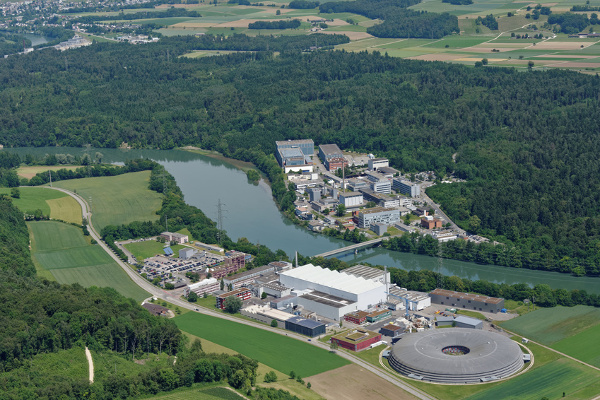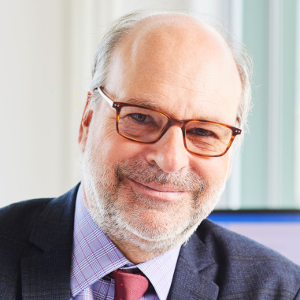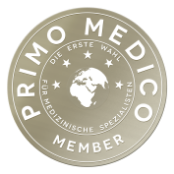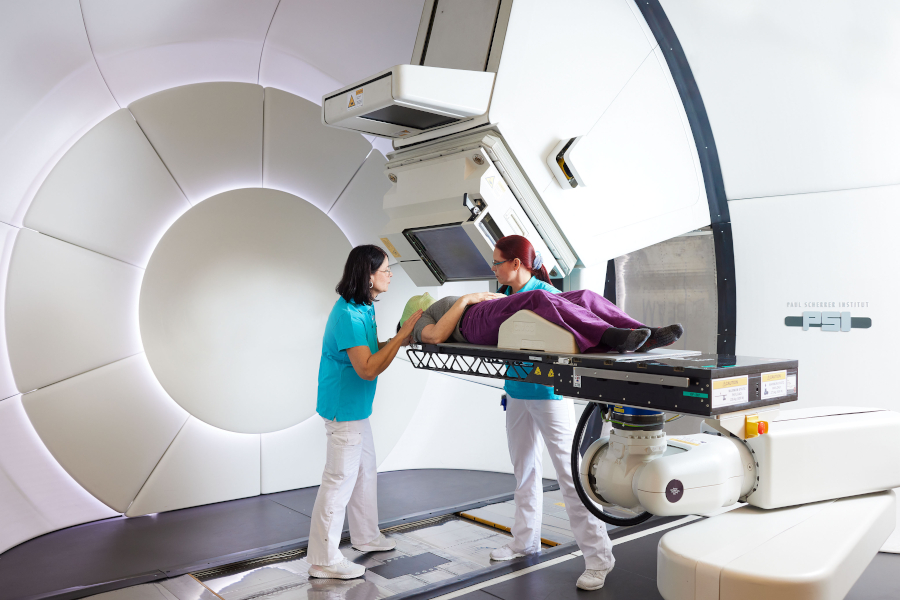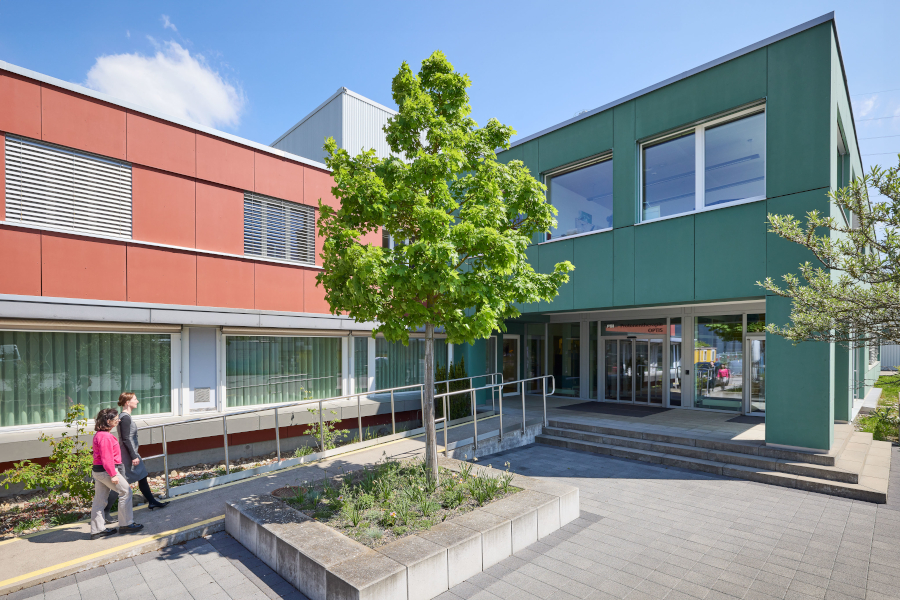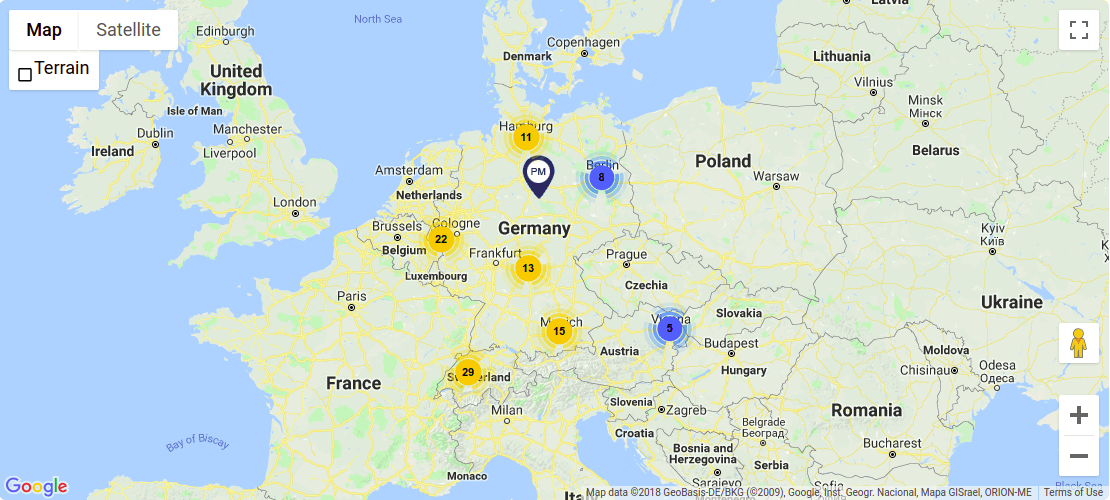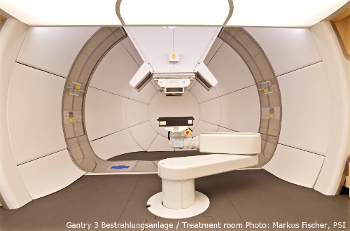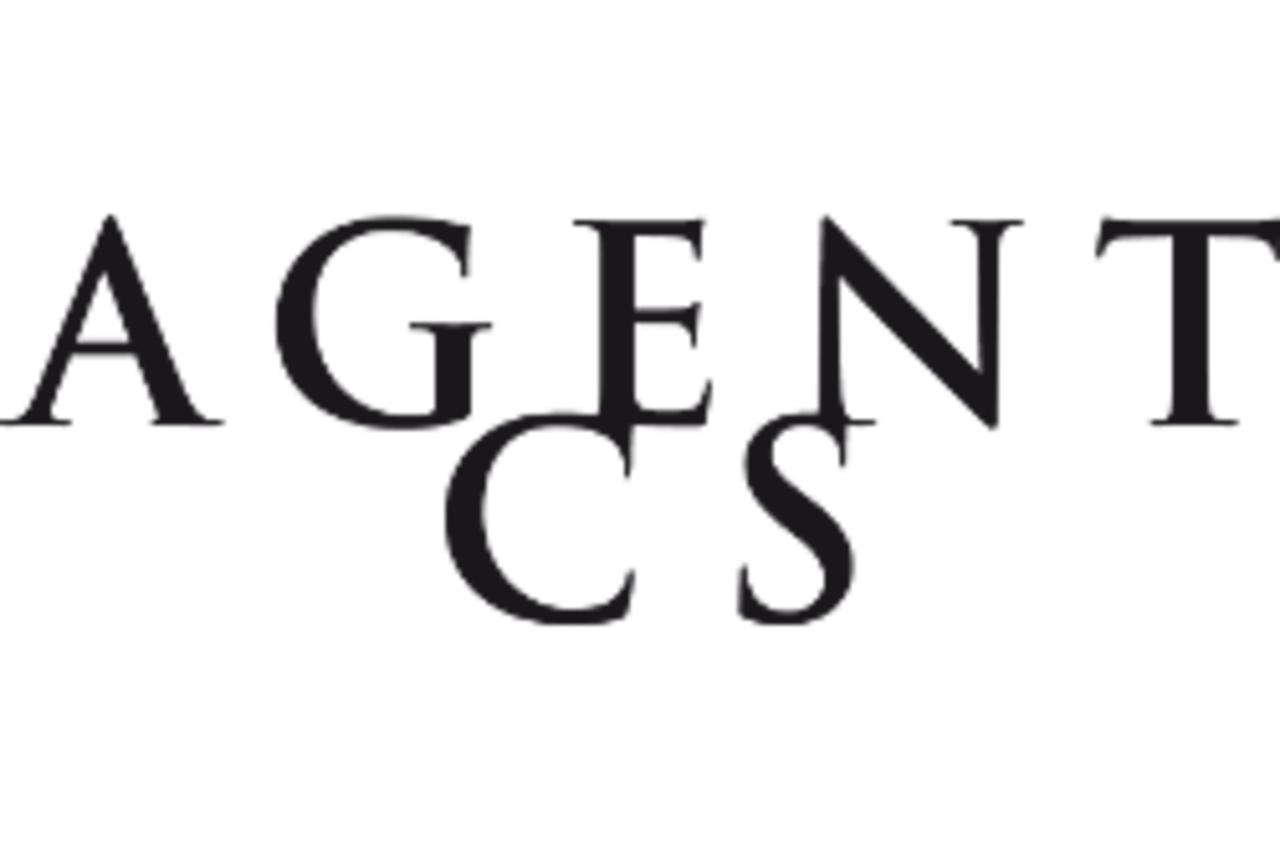Paul Scherrer Institute - Center for Proton Therapy Villigen (Switzerland): Prof Weber
Treatment focus
Proton Therapy for:
- Tumours on the head (including brain and skull base), spinal column and pelvis: meningiomas (benign and malignant), craniopharyngiomas, pituitary tumours, low-grade gliomas (grade 1 and 2), chordoma, chondrosarcoma, sarcomas, and ENT tumours (nasal area, sinus, nasopharyngeal space, and salivary glands)
- All tumours in infants, children, and adolescents, including craniospinal radiation and radiotherapy under anaesthesia
- Ocular tumours: Uveal melanoma, haemangioma, and metastases in the eye as well as melanomas of the conjunctiva and the iris
- Recurrent tumours of the aforementioned diagnosis groups
- Non-small cell lung cancer (NSCLC), inoperable, no distant metastases (UICC stages IIB and IIIA/B; treatment analogous to the international randomized controlled trial RTOG 1308)
- Esophageal cancer (operable, no distant metastases) in stages cT1-4a or cN+, cMO; (treatment as part of the international randomized controlled trial PROTECT)
Contact
Paul Scherrer Institute (PSI)
Centre for Proton Therapy (CPT)
CH-5232 Villigen PSI
P: +41 56 511 37 32 F: +41 56 310 35 15
Consultation Hours:
By appointment
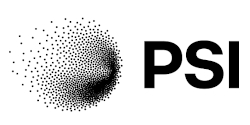
Medical Range
- Consultations for proton therapy
- Treatment planning including imaging (CT, MRI), treatment plans, and positioning of the patients
- Logistics of patient stay (appointments, reimbursement of costs, accommodation, and transport)
- Implementation of radiotherapy
- Follow-up examinations including imaging (MRI)
- Collaboration with referring physicians/clinics and other specialists in order to optimise treatment
- Conduct of clinical studies
More Information
Card
The specialist for radiation therapy and radio oncology heads the Center for Proton Therapy (ZPT) at the Paul Scherrer Institute (PSI) in Villigen, Switzerland.
Radiotherapy - An Effective Part of Cancer Treatment
Modern radiotherapy makes a significant contribution to improving the chances of cure for many types of cancer - the prognosis for cancer patients is better today than just a few years ago. Today, four out of five people with cancer are treated with radiotherapy. Radiation therapy works with ionizing radiation, which damages the genetic material in the cell nucleus and ultimately leads to the death of the cancer cell. As a result, even in the case of inoperable tumors, radiotherapy can often be successful.
In contrast to systemic treatment such as chemotherapy, radiotherapy is a local treatment method specifically targeting tumours. Therefore, radiotherapy only treats the area in the direct region of the tumour. As a result, the occurring side effects are limited to this small, restricted area as well. In radio-oncology, mainly X-rays are applied. Radiotherapy Villigen in Switzerland is one of the few institutes in the world where cancerous tumours can be treated with proton beams. At the Proton Therapy Center in Villigen, cancer patients are treated with the spot-scanning technique - also known as pencil-beam scanning. This method has been developed here and gradually established as the standard treatment option in proton therapy. All leading proton therapy centers worldwide apply this technology.
Radiotherapy Villigen - Special Characteristics of Proton Therapy
Proton therapy is a form of radiotherapy. It is characterized by a particularly precise and, therefore, gentle radiation. Whereas conventional X-rays damage not only cancer cells but also surrounding healthy cells, proton beams act far more selective. They mainly develop their effect directly in the tumor. Surrounding tissue is mostly spared and hardly affected, which also allows a higher radiation dose that can significantly improve the prognosis for particularly aggressive tumors.
The great advantage for the patient: Radiation therapy with protons places only half as much strain on the body compared to radiation therapy using X-rays, with the same radiation dose. Since proton radiation is exact and gentle, it is ideally suited for the treatment of tumors that are located in the vicinity of radiation-sensitive organs and structures. The eyes and brain, in particular, but also the spine and intestines, are sensitive to X-rays. This is where patients benefit from the high precision of the treatment.
Overview of the advantages:
- Very precise irradiation of the tumor
- High radiation dose possible
- Little impairment of healthy cells
- Minor side effects
- Improved chances of recovery
Center for Proton Therapy (ZPT) - Specialized Clinic with an International Reputation
The ZPT has been very successful for decades in the treatment of cancer with protons, a unique form of radiation therapy. Through its integration into the Paul Scherrer Institute (PSI), the most extensive research institution in Switzerland, the continuous research and development of this radiation method guarantee treatment at the highest medical and technical level.
Two treatment devices, so-called gantries, are used at the ZPT for the irradiation of deep-seated tumors (e.g., brain tumors). These devices enable an exact and, therefore, gentle form of irradiation for the patient: the spot scanning technique.
Most patients with eye tumors worldwide have been successfully irradiated with protons here. For the treatment of deep-seated tumors (e.g., brain tumors), PSI has developed a particularly precise and therefore gentle form of irradiation for the patient: The spot-scanning technique.
Eye tumors are treated with the OPTIS irradiation device. The Center for Proton Therapy at PSI has so far irradiated most patients with eye tumors worldwide with protons and has done so very successfully.
Proton therapy for Infants and Children
Besides adult patients from all over Europe, children are also treated at PSI. The treatment of childhood tumors is a primary focus at PSI, as the still-growing organism reacts particularly sensitively and benefits from precise irradiation with protons. Thanks to close cooperation with the Children's Hospital in Zurich, since 2004, even very little children who cannot lie still independently for the duration of the radiation therapy have been irradiated under anesthesia. Craniospinal axis irradiation in children using the spot-scanning technique is also possible at PSI.
Prof. Weber's Treatment Spectrum
Radio-oncology is a broad field. Tumors can develop almost anywhere in the body where radiotherapy has proven to be effective. Each type of cancer, in turn, requires a specific therapy that must be adjusted precisely to the patient and the type of tumor. Prof. Weber has specialized in radiation oncology with protons at the Radiation Therapy Villigen in the Paul Scherrer Institute. This promising field of radiotherapy is also the subject of his scientific research, with which he has already gained an international reputation.
Proton therapy has proven to be particularly useful for certain tumor diseases in the head, spine, and pelvis. Therefore, the treatment of such tumors is also the focus of Prof. Weber's work. Cancer tumors located particularly deep inside the body - for example, in the brain - can be treated well with proton therapy. In contrast to conventional X-rays, protons emit only a small amount of radiation on their way into the body. They develop their full power only at their destination - the tumor.
Proton Irradiation in Children and Adolescents
Another important focus of his work is the treatment of tumors in young patients - whether in infants, children, or adolescents. Particularly when it comes to the irradiation of children, it is essential to minimize long-term side effects of radiation therapy as far as possible. Children who have undergone radiation therapy often show deficits in growth and development later on. Besides, the unavoidable damage to healthy body cells during conventional radiation increases the risk of developing a new tumor decades later.
Such consequences can be limited as far as possible by the precise and gentle proton irradiation. This form of radiation is, therefore, ideally suited for all types of cancer in young patients in childhood. It is Prof. Weber's concern to give children with cancer and their parents a perspective for the future that allows them to lead a completely normal life. To achieve this goal, the specialist works closely with referring clinics and doctors as well as experts from other medical branches.
Proton Radiation of Eye Tumors
A variety of cancers can also occur in the eye - melanomas of the choroid, iris, or conjunctiva, hemangiomas, and metastases. Particularly in the sensitive eye, a specifically gentle treatment is required - because the tumor must be destroyed and, if possible, the ability to see must be maintained. Prof. Weber also has a great deal of experience and expertise in radiation therapy in the field of the eyes. Radiation Therapy Villigen also has a radiation device that was specially designed for the treatment of eye tumors. The irradiation with protons allows an exact procedure, in which essential structures and nerves of the eye can be largely spared.
Trustful Relationship Between Doctor and Patient
The treatment of your cancer is in the best hands of Prof. Weber in Villigen. Particularly important to the expert is a patient-oriented treatment, which has been discussed in detail with the patient in advance. The well-respected specialist in radiation therapy attaches great importance to informing you comprehensively about the goal-oriented treatment and effectiveness, risks, and chances of recovery transparent for you. Finally, the decision for or against treatment is always up to you.
The team around Prof. Weber consists of highly qualified radio-oncologists, medical physicists, medical-technical radiology assistants, and many other professionals who take care of patient treatment and ensure the smooth operation of the highly complex equipment.
Prof. Weber is an internationally designated expert, especially in the field of proton therapy. Through his scientific work and his international commitment, he contributes significantly to the establishment and further development of proton therapy.
Please, click here for further information on the Center for Proton Therapy
Curriculum Vitae
| 1993–1996 | Internal Medicine, University Hospital of Geneva Dr F. Waldvogel |
| 1996–1997 | Medical Oncology, University Hospital of Geneva Dr P. Alberto |
| 1997–2000 | Radiation Oncology, University Hospital of Geneva Dr J.M. Kurtz |
| 2000–2002 | Northeast Proton Therapy Enter, Radiation Oncology, Massachusetts. General Hospital, Harvard Medical School, Boston, JS Loeffler MD |
| 2003–2004 | Senior Radiation Oncologist, Paul Scherrer Institute |
| 2003–2007 | Staff Radiation Oncologist, Radiation Oncology Department, Geneva University Hospital |
| 2006 | Private Docent, Faculty, UNIGE School of Medicine |
| 2008–2013 | Vice Chairman, Radiation Oncology Department, Geneva University Hospital |
| 2010–2013 | Chargé de Cours, UNIGE School of Medicine |
| 2013 | Head and Chairman, Centre for Proton Therapy, PSI |
Team
- PD Dr Barbara Bachtiary, MSc
Senior Radio-Oncologist - Dr Dominic Leiser
Radiation Oncologist, Responsible for Clinical Trials - PD Dr Alessia Pica
Senior Radio-Oncologist
Extras
- Good accessibility by public (plane, train, and bus) and private transport (plenty of parking)
- Wi-Fi and public PC in the waiting area
- Separate, child-friendly waiting from with plenty of toys
- Accommodation in apartments in the surrounding areas (up 20 km in Germany in Switzerland)
- Cafeteria
Transport Connections
| Döttingen Train Station | 6 km |
| Brugg Train Station | 10 km |
| Zurich Airport | 39 km |
| Basel Mulhouse Freiburg Airport | 69 km |
Medical Articles
Center for Proton Therapy at the Paul Scherrer Institute
Center for Proton Therapy at the Paul Scherrer Institute
The Treatment of Cancer with Protons - Proton Therapy at the Paul Scherrer Institute in Switzerland
The Treatment of Cancer with Protons - Proton Therapy at the Paul Scherrer Institute in Switzerland
High-tech against cancer: new treatment facility put into operation
At the Paul Scherrer Institute in Switzerland a new state-of-the art treatment facility, the so-called Gantry 3, has been put into operation.
Read moreInformation about Villigen
Villigen is a municipality in the Swiss canton of Aargau. It belongs to the district of Brugg and lies about five kilometres north of the district capital in the Aare valley. The remains of Besserstein Castle can be seen on the rocky head of the Geissberg, which rises steeply above the village to the west. There are more than ten fountains in the village itself, which is why Villigen is also known as the "village of beautiful fountains". Two of them, the Halseisen and Schmitten fountains, which were built in 1583 and 1814 in the late Renaissance style, are now listed buildings, as is the Reformed Church.
